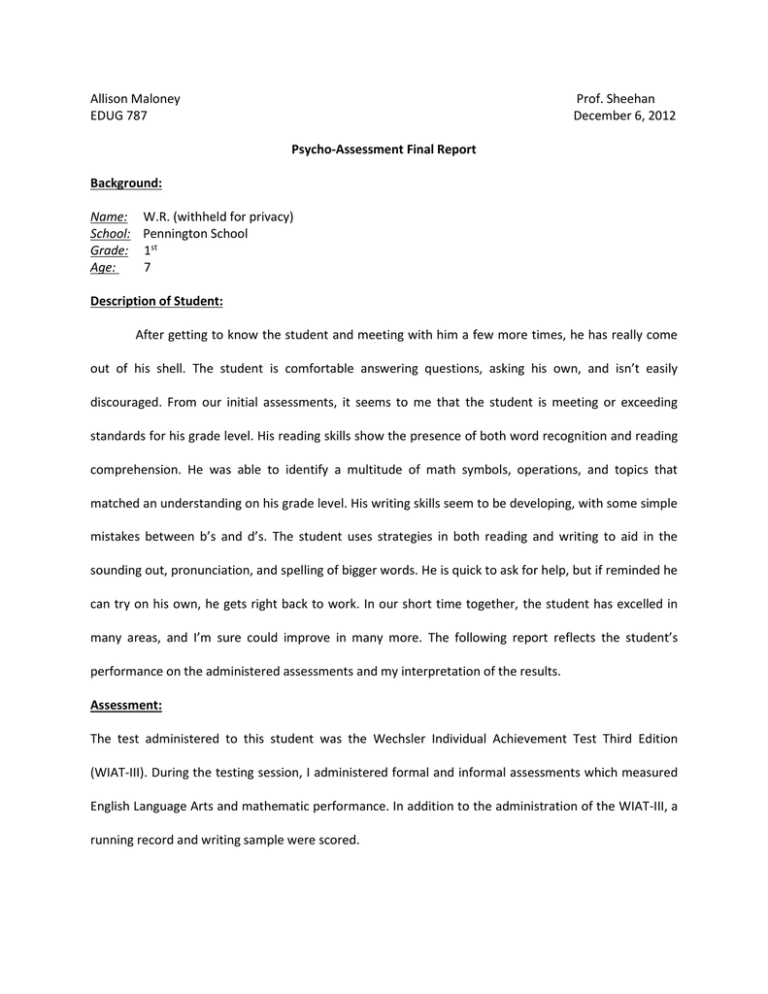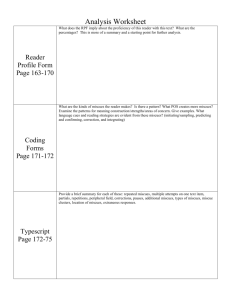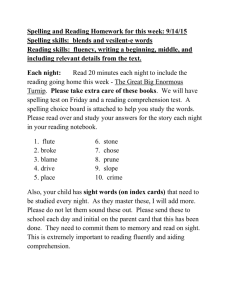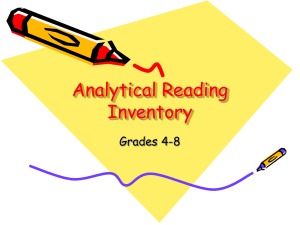Psycho-Assessment Final Report - Allison Maloney's Education
advertisement

Allison Maloney EDUG 787 Prof. Sheehan December 6, 2012 Psycho-Assessment Final Report Background: Name: School: Grade: Age: W.R. (withheld for privacy) Pennington School 1st 7 Description of Student: After getting to know the student and meeting with him a few more times, he has really come out of his shell. The student is comfortable answering questions, asking his own, and isn’t easily discouraged. From our initial assessments, it seems to me that the student is meeting or exceeding standards for his grade level. His reading skills show the presence of both word recognition and reading comprehension. He was able to identify a multitude of math symbols, operations, and topics that matched an understanding on his grade level. His writing skills seem to be developing, with some simple mistakes between b’s and d’s. The student uses strategies in both reading and writing to aid in the sounding out, pronunciation, and spelling of bigger words. He is quick to ask for help, but if reminded he can try on his own, he gets right back to work. In our short time together, the student has excelled in many areas, and I’m sure could improve in many more. The following report reflects the student’s performance on the administered assessments and my interpretation of the results. Assessment: The test administered to this student was the Wechsler Individual Achievement Test Third Edition (WIAT-III). During the testing session, I administered formal and informal assessments which measured English Language Arts and mathematic performance. In addition to the administration of the WIAT-III, a running record and writing sample were scored. Testing Results: Wechsler Individual Achievement Test Third Edition WIATT-II Subtest Standard Score Percentile Qualitative Descriptor Receptive Vocabulary 114 82% Above Average Early Reading Skills 101 53% Average Reading Comprehension 100* 50% Average Math Problem Solving 99 47% Average Alphabet Writing Fluency 117 87% Above Average Sentence Combining 149 >99.9% Very Superior Word Reading 111 77% Average Numerical Operations 113 81% Average Spelling 107 68% Average Writing Sample Results: (from the Roxbury Public Schools Scoring Rubric Grades 1 and 2 – attached) Stages Ideas Organization Word Choice Sentence Fluency Voice Conventions Descriptor Topic is stated in text; story line is present, but loosely put together Some ideas are supported with details but may lack focus Beginning and middle OR ending are present, one component is missing (middle/ending) Transitions rely on connective “and” Sequencing is apparent Vocabulary relies upon “safe” known words, yet an attempt to incorporate a few lesser-known words is beginning Adjectives begin to add description Simple sentences are used to convey meaning Variety in beginnings becomes apparent Voice supports writer’s purpose Risk-taking provides a moment or moments of sparkle Phonetic spelling is used; some grade level high frequency words are correct Ending punctuation exists Uppercase letters begin sentences Raw Score Actual Score Score 3 3 3 3 4 2 18 3 Reading - Running Record: Title: Curious George Visits the Zoo Author: Margaret Rey Word Count: 388 Pages: 30 Level: J Student Miscues 13 Self-Corrections 9 Miscues reader did not self-correct 4 Accuracy Rate: 96% 100% 0 miscues 99% 1 miscue 98% 2 miscues 97% 3 miscues 96% 4 miscues *96%-100% accuracy is necessary to determine the reader’s independent reading level. Retest if 5 or more miscues present. III – Discussion Overall, this student preformed on or above grade level for each area tested. Looking through the subtests of the WIAT-III, the student scored Above Average or higher in sections pertaining to Receptive Vocabulary, Alphabet Writing Fluency, and Sentence Combining. While mathematics did not come across as his weak point, he certainly excelled in more areas pertaining to English Language Arts. The student was receptive to the demands of each assessment and generally eager to answer the questions asked. Looking at the results of each subtest of the WIAT-III administered, the student shows no obvious areas of weakness when compared to peers on his grade level. From the writing sample the student completed, a rubric was used to score the student’s writing abilities based on his ideas, organization, word choice, sentence fluency, voice, and conventions. Reading through his writing piece, the student’s ideas and voice are apparent. He has his own “spark” that shines through, while sometimes compromised due to poor sentence structure or spelling errors. Overall, the student was confident in using lesser known, more complicated words to convey his voice. When spelling these words, the student sounded out and came close to the phonetic spelling for most. The student showed knowledge of capitalization and punctuation rules, but could improve his sentence structure by avoiding using “and” as a transition. His writing stayed true to his topic of Halloween and scored an overall score of 3 on the rubric provided. This supports that the student is writing on task for the average first or second grader, while still having room to improve and grow as a writer. To assess the student’s reading fluency, a running record was performed using the book Curious George Visits the Zoo by Margaret Rey. While reading aloud, the student had a total of 13 miscues. Of the 13 miscues, the student self-corrected 9 times, with 4 miscues he did not self-correct. This is a 96% accuracy rate on Level J, which is a second grade reading level. His number of self-corrections shows that the student is using various strategies to decode words and comprehend the text as a whole. IV –Recommendations While the assessments showed no obvious areas of deficit or struggle for the student, he could improve upon the skills he has already begun to master. In reading, the student should focus on improving his reading fluency by choosing appropriately leveled independent reading books. While his accuracy rate met the requirements for the Level J, he may want to start on a level below and build towards fewer miscues before attempting Level J books independently. In math, it is recommended that the student continue to master simple addition and subtraction using visuals, moving towards numerical equations using larger numbers. He exhibited various skills when working through the mathematical subtests and his confidence will be an asset to him has he begins encountering harder problems in the future. Based on the assessments administered, the student could benefit from the most by focusing on building his writing skills. While his voice is strong and his ideas creative, the student should work on the structure of sentence formation; avoiding run on sentences and transitions using “and” multiple times. His oral vocabulary surpasses his written vocabulary skills, so many of this spelling errors are due to the complexity of words he wishes to use in his writing. Even so, his spelling errors follow phonetic spelling for the most part. The student’s score of 3 on the rubric provided shows he is progressing as he should with room to improve and grow. In conclusion, the student was truly a pleasure to work with, genuinely enjoying our time together. His willingness to learn, ask questions, and participate in new things will serve him well in his academic career. While the assessments and recommendations above are based solely on our few short sessions together, the student certainly exhibits many of the skills and qualities needed for success within the classroom.





